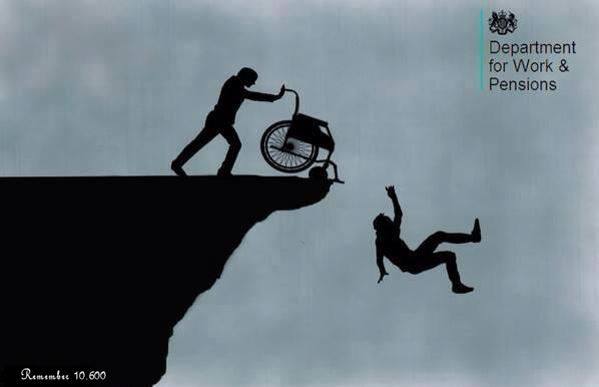
By John Pring Disability News Service 22nd March 2018
The Department for Work and Pensions (DWP) is refusing to pay back as much as £150 million owed to disabled people as a result of botched efforts to move them onto the new employment and support allowance (ESA).
The National Audit Office (NAO) published a report this week into its investigation into historic underpayments made by DWP following the reassessment of people on older-style benefits such as incapacity benefit (IB) onto the new out-of-work disability benefit ESA.
The report concludes that DWP underpaid about 70,000 people between February 2011 – when the reassessment process began – and the end of 2014, because of its failure to realise that many of these claimants were entitled to income-related ESA and associated disability premiums in addition to the contributory form of ESA.
But because the social security upper tribunal only ruled on 21 October 2014 that DWP had been wrongly following social security legislation, ministers say they can legally only pay arrears to those whose claims were still live on that date and who were subsequently underpaid.
This means that it will not pay back an estimated £100 million to £150 million in arrears that date from before 21 October 2014, which DWP says it cannot legally pay.
DWP is still likely to have to pay about £340 million in back-payments for claims that were live on 21 October 2014, with average payments likely to be about £5,000, although a small number could receive as much as £20,000.
It has promised to pay all these arrears by April 2019 and will have to review about 300,000 cases to identify those affected.
DWP first became aware of the issue in 2013 but did not recognise it as “systemic” until 2014, according to the NAO report, and failed to recognise its legal responsibility to identify the people affected and develop a response until July last year.
Ken Butler, welfare benefits advisor at Disability Rights UK, said the NAO report shows “a shambolic catalogue of mistakes which have had a massive impact on tens of thousands of disabled people who qualified for benefits they were denied”.
But he said that disabled people “should not be expected to pay for the DWP’s mistakes.
“The government’s unwillingness to backdate payments beyond 2014, citing legal restrictions, means that disabled people could still be underpaid arrears of up to £150 million.”
He said DR UK knew of cases where backdated payments had been made to claimants dating back to 2011, and he added: “We would encourage anyone affected to seek advice from benefit specialists to challenge the government’s position through the appeals system.”
He said the report was “the latest in a series of examples of the poor administration and implementation of welfare reform.
“From inadequate assessments through to poor policy-making, disabled people continue to be hit by changes to a system which is supposed to help them become more independent and fails to do so.”
Linda Burnip, co-founder of Disabled People Against Cuts (DPAC), said: “It is disgusting that DWP are refusing to refund payments disabled people have lost due to their errors and incompetence.”
She said DWP’s refusal to pay all the refunds “can only be described as theft”.
Dr Philippa Whitford, SNP’s shadow spokeswoman on health, said in a Commons debate yesterday (Wednesday) that the refusal to pay pre-October 2014 arrears was “a bit funny, because when we have to pay the government, somehow there is never a statute of limitations”.
Burnip said: “We have to ask just where does the incompetence of DWP stop?
“This ‘error’ has been ongoing and known about for over four years yet only now is anything being done to address the failures of DWP to pay disabled people the correct amount of social security payments to which they were entitled.
“Why has such a massive systemic failure been covered up and ignored?”
Burnip said a further “vital” issue was whether the payment of arrears in a lump sum could leave some disabled people over the qualifying level of savings for income-related ESA, which could put some of their ongoing entitlements at risk.
DPAC has called for an exception to be made by DWP, so the back-payments are disregarded in the same way as criminal injuries compensation awards.
Frank Field, chair of the Commons work and pensions committee, said: “This is a damning report.
“The department is quick to act in cases of overpayment, quick to sanction claimants for any breach of its rules, but when the shoe is on the other foot [it] has shown it will take years to recognise and get to grips with its own mistakes.
“This must have caused even more hardship for people, many of whom have struggled through an assessment process that we heard from thousands of accounts is, for some, gruelling and humiliating, and riddled with errors and wrong decisions.”
A DWP spokeswoman said there were “no plans to change the law” to allow DWP to pay arrears for pre-October 2014 claims.
She said: “Section 27 of the Social Security Act 1998 is mandatory and therefore we have to apply it where a relevant determination has been made by a tribunal.
“This approach has recently been confirmed by a judgement of the upper tribunal in January 2018.”
She said DWP was “well underway with our plan to identify and repay people affected by this issue, and payments have already started”.
She added: “We have already reviewed over 4,000 cases, of which around 1,500 cases were incorrect and have been paid arrears of just over £9 million. The first payments were made in September 2017.
“When we were made aware of individual cases relating to this issue in 2013, these were dealt with at the time and additional guidance was put in place.
“The vast majority of cases transferred to ESA were done so correctly.”
